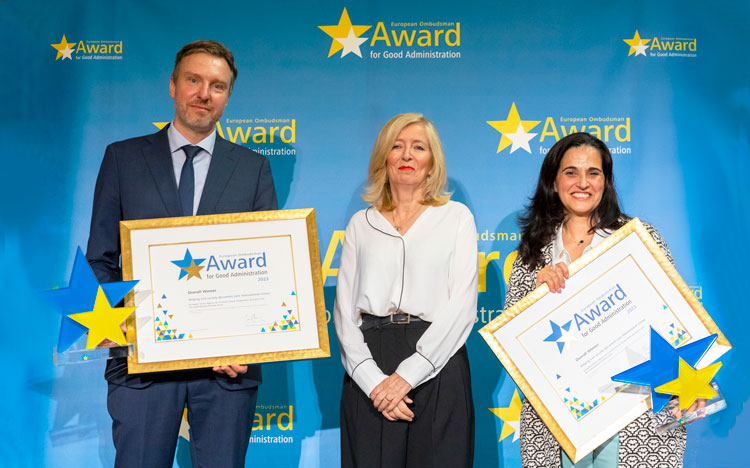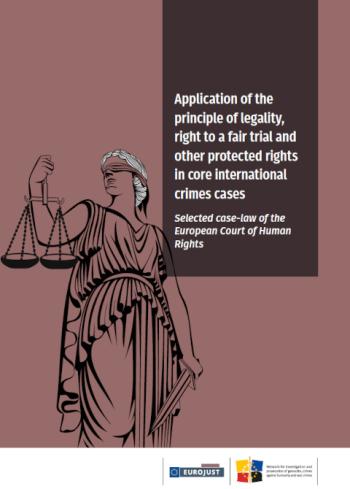The crime of genocide, crimes against humanity and war crimes (known collectively as core international crimes), threaten the peace, security and well-being of our world. The escalation of nearby conflicts in the European Union’s wider neighbourhood, combined with the influx of refugees to the Member States in recent years, has left States struggling to manage a growing number of challenging cross-border cases.
- In 2023, the number of investigations and prosecutions of core international crimes opened before domestic jurisdictions of EU Member States continued to rise.
- This growing trend reflects the increasing willingness and ability of national authorities to play their part in the fight against impunity.
- These cases, mostly based on extraterritorial and universal jurisdiction, often represent the only hope for justice for victims and survivors living in all corners of the world.
Operational support to core international crime (CIC) cases

The overall number of CIC cases handled by Eurojust increased once again in 2023, with a larger number of joint investigation teams supported by the Agency.
During 2023, Eurojust continued to support CIC investigations and prosecutions related to the armed conflict in Syria and various other countries, in addition to Ukraine. Support was requested in cases concerning all three categories of core international crimes (war crimes, crimes against humanity and genocide), as well as related crimes.
National judicial authorities sought the Agency’s assistance to facilitate the establishment of JITs, the execution of (urgent) EIOs and MLA requests, the hearing of witnesses and the exchange of information with third countries.
Eurojust’s Core International Crimes Evidence Database (CICED), which became operational in 2023, has been instrumental in enabling the Agency to support national judicial authorities in identifying evidence located in another country that may be relevant to their own investigation into one or more core international crimes.
Advanced Workshop on international humanitarian law and counter-terrorism
In April 2023, the Genocide Network and the Eurojust Counter-Terrorism Working Group organised an Advanced Workshop on international humanitarian law and counter-terrorism for national investigators and prosecutors. The workshop was designed around a fictitious case and focused on interlinkages between the two areas of law, exploring potential legal issues faced by investigators and prosecutors dealing with crimes committed during armed conflicts involving terrorist organisations.
33rd Genocide Network meeting on corporate criminal accountability for core international crimes
The 33rd Genocide Network meeting in April 2023 was dedicated to the issue of corporate criminal accountability for core international crimes and associated challenges. Participants considered the general legal framework for such liability in various Member States, recent cases, experiences and trends, outstanding challenges, as well as expert views on how corporate liability can be addressed using creative accountability avenues.
Suggested approaches to hold companies headquartered or operating in the jurisdictions of Member States accountable as enablers of human rights violations or core international crimes were discussed. Investigating corporate crimes is complex and raises practical and legal challenges for law enforcement and prosecution services, but new online and open-source research tools can help investigators overcome some of these obstacles. Civil society can also play an important role in support of corporate liability cases.
34th Genocide Network meeting on core international crimes committed by ISIL against the Yezidi community
The 34th Genocide Network meeting in November 2023 focused on the investigation and prosecution of core international crimes committed by ISIL against the Yezidi community in Iraq and Syria. With many ongoing investigations and prosecutions of crimes committed by EU nationals who joined ISIL, and with repatriations presenting possible new cases, the topic proved highly relevant and timely. Participants discussed the complexity involved in prosecuting the crime of genocide, including novel examples of how to prove criminal intent.
Specific issues discussed include the prosecution of perpetrators and bringing justice to Yezidi survivors, the relevance of the destruction of the Yezidi cultural and religious identity in the commission of genocide, strategies for prosecuting sexual violence and slavery, the role of women within ISIS, judicial cooperation between national authorities and access to evidence.
8th EU Day Against Impunity
In recent years, EU Member States have secured convictions for crimes committed as far back as 40 years ago in places such as Syria, Afghanistan or Rwanda. This demonstrates how universal jurisdiction has served as a powerful tool in the fight against impunity for genocide, crimes against humanity and war crimes.
The EU Day Against Impunity is an annual event that promotes national investigations and prosecutions into genocide, crimes against humanity and war crimes. It recognises the efforts of the European Union and Member States to enforce international criminal law and addresses the position and participation of victims in criminal proceedings. In 2023, the EU Day Against Impunity was co-organised by the Swedish Presidency of the Council, the European Commission, Eurojust and the Genocide Network. This edition was dedicated to stepping up the fight against impunity with national, EU and global responses.
23 May marks the EU Day Against Impunity, but the quest for justice transcends national, continental and organisational boundaries. Core international crime investigations take place in a fragmented and complex operational landscape, and that is where Eurojust’s contribution comes in. We pool expertise, gather evidence and ensure cooperation between prosecutors and judges so that justice can be delivered across borders.
The EU Day Against Impunity 2023 took place in Ljubljana as part of the MLA Diplomatic Conference for the Adoption of the Convention on International Cooperation in the Investigation and Prosecution of Genocide, Crimes Against Humanity, War Crimes and other International Crimes. The so-called Ljubljana-The Hague Convention was adopted during the MLA Diplomatic Conference and represents a landmark international treaty that will help to deliver justice to victims of genocide, crimes against humanity and war crimes. The Convention ensures strengthened international legal cooperation and is expected to significantly reduce impunity for perpetrators of crimes.
The Convention also foresees that State parties should establish extraterritorial jurisdiction over core international crimes when the alleged offender is present on the State party’s territory. More information is available in the Genocide Network’s leaflet ‘At a Glance: Universal Jurisdiction in EU Member States’, published on the occasion of the EU Day Against Impunity. The leaflet provides an overview of the current state of universal jurisdiction in EU Member States’ legislations, and recent judgments from universal jurisdiction cases illustrating this legal principle in practice.
Application of the principle of legality, the right to a fair trial and other protected rights in core international crimes cases
This report published by the Genocide Network in October 2023 outlines the most prominent cases in which the European Court of Human Rights evaluated the application of Article 7 of the European Convention on Human Rights (ECHR). The decisions presented in this report confirm that the retroactive application of domestic criminal law is, in certain cases, possible for war crimes, crimes against humanity and the crime of genocide. The report also examines the application of universal jurisdiction regarding the right to a fair trial and the duty of a state to investigate these crimes effectively, as well as fair trial guarantees for the purpose of extradition.
The report offers national authorities comprehensive expertise and encourages them to explore the legal possibility of conducting investigations and subsequent prosecutions of core international crimes, even if the acts in question were committed before the relevant provisions in their national legislation were implemented.
The European Ombudsman Award for Good Administration 2023
The Guidelines to help Civil Society Organisations document international crimes and human rights violations for accountability purposes (jointly developed by Eurojust, the Genocide Network and the Office of the Prosecutor of the International Criminal Court) were nominated for the European Ombudsman’s Award for Good Administration by the Slovak NGO, Human Rights League, in February 2023.
The CSO Guidelines represent an outstanding example of a swift, needs‐based, timely and rapid institutional reaction to fill the need for guidance, at the outbreak of the war, to ensure that information we collect is gathered in a way to be used as evidence in future prosecutions at the national and international level.
On 28 June 2023, the Guidelines won the overall European Ombudsman Award for Good Administration. The Guidelines also received a separate award in the category of ‘Excellence in Citizen-Oriented Delivery’.

The winning Guidelines are the result of extensive cooperation and bring together the expertise of Eurojust, the Genocide Network, the Office of the Prosecutor of the International Criminal Court, civil society organisations (CSOs), national prosecutors and international partners. They empower CSOs to effectively collect and preserve information on international crimes and human rights violations, which may become admissible evidence in court. Concrete guidance is given on how to document information, including information collected on the ground during international conflicts, for the purpose of supporting future national or international prosecutions.
Around 1 000 copies of the Guidelines were printed in 2023 and distributed to CSOs during several events and round tables. The authors are working on an outreach strategy to ensure further dissemination of the Guidelines, including several technical briefings that started in 2023 for specific regions where the Guidelines will be particularly useful. The Guidelines are currently available in English, French, Spanish, Arabic and Ukrainian.
Belgium and Netherlands sign up to joint investigation team targeting crimes against Yezidi victims in Syria and Iraq
Crime: During the armed conflict in Syria and Iraq, core international crimes are committed by foreign terrorist fighters (FTFs) against the Yezidi population.
Action: The JIT targeting crimes against Yezidi victims in Syria and Iraq is extended. The JIT agreement, initially signed between Sweden and France in October 2021, is extended to judicial and law enforcement authorities in Belgium in October 2022 and the Netherlands in May 2023.
Result: The cooperation via the JIT leads to the identification of several suspects and victims relevant to national investigations. One example is the decision of the Stockholm District Court in March 2023 to issue a European Arrest Warrant for a Swedish citizen suspected of aiding and abetting crimes against humanity in Syria. In France, the identification of a Yezidi victim enables charges of genocide and crimes against humanity to be added to an existing case against a French jihadist couple. In the meantime, in Belgium, links have been made with the French investigations, and witnesses and victims of Belgian FTFs have been identified and interviewed thanks to the exchange of information within the JIT. In the Netherlands, an indictment has been issued for the crime of slavery committed against a Yezidi victim. The case against the accused, a Dutch citizen, is still pending in court.
Eurojust's Role: Eurojust assists in setting up the JIT and organises five coordination meetings in 2023. The Agency also helps to determine possible conflicts of jurisdiction and avoid multiple interviews of the same victims. The Genocide Network Secretariat, hosted by the Agency, also supports by sharing knowledge, expertise and best practices between specialised Contact Points during the 33rd Genocide Network meeting, dedicated to CICs committed by ISIL against the Yezidi community.



